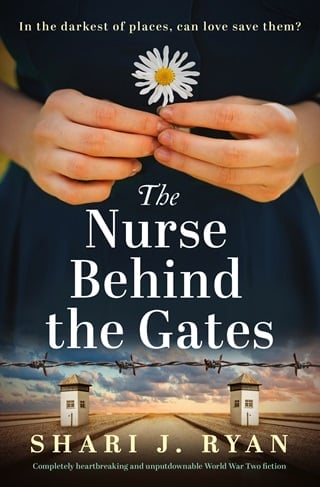47. Danner
FORTY-SEVEN
Munich, Germany
With a weightless body drooping between my tired arms, I shake and wobble while bringing yet another deceased man to the wagon where the other bodies wait. The few remaining SS guards on site told us to move these people away from the crematorium that can’t be used at the moment. No one said why and no one knows where the rest of the guards went. They’ve just told us to move the pile of bodies.
The repetitive motions are mindless, allowing me to multi-task—work and dwell while I tell myself that I’ll soon be one of those bodies, strewn like a dirty rag. Then I switch thoughts to worry about Emilie—where she is and what she’s doing, if she’s forgotten about me, or worse… There are never answers, and there have been plenty of questions circling around the barracks because only half of us remain of the population that was here a few weeks ago. We don’t know why.
Last week, when most of the SS left the camp, they took half of us and sent them marching away to God only knows where. They took my only friend—the only person I had left. There was no reason why it was him instead of me, and I’ll never know. I just know that I’m here and he’s not, and there must be a reason for why there are only a few guards remaining here.
“Do you hear that sound too?” the guy standing next to me with a matching shovel asks through a hoarse whisper.
“Gunshots?” another grave digger replies.
“Those aren’t blasts coming from German guns,” another says.
“If not a German weapon…something is happening,” the man beside me says, his voice cracking.
The seconds between the last statement and a growing roar of commotion feel like an eternity as I consider what we’re hearing. One by one the six of us, who had been digging, drop our shovels. The dry dirt bursts up into fine grains from the ground, covering our shoes.
“Amer… …diers,” someone cries out.
We all exchange a look, trying to decipher what we’re hearing. “Ameri-diers?”
“They’ve come,” a stronger voice shouts from nearby. “They’ve come for us.”
The six of us stumble, dragging our toes in the dirt with each step, holding our hands above our heads to shield our eyes against the blinding sunlight.
Others spill out of various blocks along the way. Some trip but continue forward, crawling. Others fall to their knees, holding their hands over their hearts and stare up to the sky as tears leave white streaks down their faces.
We pick up our pace, walking past another shout. “God has sent the Americans to save us!”
Remarks bellow through a megaphone, remarks most of us can’t understand since they aren’t speaking German. The English language is enough comfort beyond whatever they are trying to convey. We continue forward, each step like lifting an iron weight tied to each foot, but we’re close to the rest of the crowd. When the exterior barbed wire gate comes into view, I watch a soldier take the megaphone from another and begin to speak. This time, the words are in Yiddish, which I can understand. “Medical aid and food are on its way; we need you to stay put until assistance arrives.”
The cheers become silent as if someone has turned down the volume on a radio.
“Emilie,” I cry out. “You were right. Emilie! Where are you? Can you hear me?” I buckle to my knees and roll to my side before folding over like a pancake. “Can you hear me?” Is she there with the Americans? Did she bring them here? Someone must have saved me, must have saved us. It had to be her. She promised, even though she never came back. I knew she wouldn’t break her promise.
More American soldiers line the exterior gates, all staring at us as if they don’t know what we are. They shouldn’t be afraid of us. We aren’t going to hurt them. “Have you seen Emilie?” I shout toward them. “Is she out there with you?”
No one answers me. They look like they can’t hear me. They’re staring through me like I’m a faint patch of fog. “Hello?” I shout. “Tell Emilie I’m here. I’m still here.”
I can’t hold myself up while I wait for them to respond so I curl up on the dirt-covered ground, pulling my sharp knees into my rib cage, but I keep my eyes open, staring at the soldiers so they don’t disappear.
“Please help,” I cry.
 Fullepub
Fullepub 



